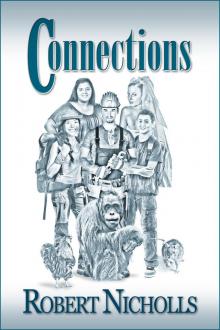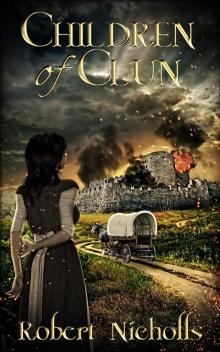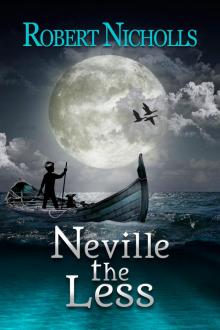- Home
- Robert Nicholls
Children of Clun Page 7
Children of Clun Read online
Page 7
Then Margaret added, more thoughtfully, “It is interesting, though. The ones that do manage to come back! Spoils of war, and all! Why I’ve heard tales of men coming back with feather beds balanced on their heads!”
“Much good that’d do them,” muttered Roland (while making a mental note to have Rowe look a little more carefully into the villagers’ housing). “On beaten dirt floors – puking and pissing in their sleep, no doubt.”
There seemed no answer to their questions or to their ire. All they knew was, they’d been summoned to Clun to act as hosts and protectors to a sixteen-year old girl, a French bastard and his new wife. And half a tribe of Scots had also shown up on their doorstep! If that was all there was to the story, they would each eat a leather hat!
* * * *
The last threesome that the moon peaked in on, were Lady Joan, Sir Perceval and Marie. In the single room that they shared, they drank cold water from a pitcher and picked at a plate of fruit and cheese.
“Do you think I impressed them?” asked Joan. “I think I did! Or would have! If Sir Cyril hadn’t let me down. Where is the blasted man? Should have been there! To put on a splendid show of force for me! And what on earth was that Scottish person saying? Was she implying that James is a prisoner? How dare she speak to me like that?”
“They are simple people,” smiled Perceval. “Permit me, though, to remind you, Lady Joan. That you don’t yet know why you’ve been summoned to this place! Or who’s behind it. I know that you have your suspicions . . . and your hopes. But all you have to protect you are a missing knight and my poor self! And your father’s name, of course! And you know, I have heard stories of these Marches! Even as far away as France! Men who are tame in other parts of your country . . . well, they may feel free to do things here that they would not dare in the rest of England! So, I beg of you . . . be careful.”
“Careful,” said Marie wearily as she slipped under the covers of the bed. “A thing for us all to be! Careful what we say. Careful what we do. Not let our hopes . . . or our curiosity . . . lead us into, as they say, the bramble patch.” She gave Perceval a meaning look, smiled and closed her eyes.
In a little while, the moon, at the end of its night’s journey, did the same.
Chapter 7 – What the Wind Discovered
Before morning came, a wind came. It wasn’t a big wind yet – just strong enough to heft a line of wayward clouds down out of the north. An observer might have noted that it seemed to be taking them toward France. Clouds and kings – neither seemed able to resist the pull of France.
With rising strength, and before the sun peeped up, the wind had well and truly flung the first clouds on their way and started a stampede of others, galloping after. Then it dropped a cold foot down onto the Marches and the late summer ended. The sun, weary in its age, was hardly surprised.
Of the many who would be surprised, the first to notice the change were the thoroughly lost and disoriented knights, Sirs Cyril Halftree and Angus of Atholl. The wind found them, still sitting astride their horses, halted at a crossroad, both shivering just inside the realm of sleep. It was said that French knights at Agincourt mounted their horses at dusk, the day before the battle, and stayed in the saddle all night, so their armour would be gleaming and clean for their slashing charge through the ranks of the English. Unhappily, spending the night with iron clad men on their backs had done nothing for the enthusiasm of the horses when that fateful day broke.
And the same was true of Angus’ and Cyril’s horses. The men had ridden out on borrowed saddle horses rather than on the great coursers that were born and bred to carry the weight of armed knights. These horses belonged to a different guild. On this morning, their shoulders ached, their backs were sore and their fetlocks were killing them. It was clear to them that the drivers were asleep at the reins and the whole expedition had gone beyond a joke. And now the blessed wind was starting to blow! So, sighing like an old man with a chilblain, the bay carefully lowered his knees to the roadside turf and, against all his training, allowed Sir Cyril to topple with a clank onto his face.
On Sir Angus, the effect of the clamber was instantaneous. He flailed into consciousness with the same sort of heart stopping terror that a frog might feel if it had fallen asleep inside a bell and been woken by the first boom of the clapper. His arms flew out to protect himself, his heels jerked into his horse’s ribs and a sound, like a priest at a devils’ convention, escaped him. “Ahhhhhh!” – rising very smartly at the end to a pinched little squeak.
The effect on Sir Cyril was less obvious. The sudden dislodgment had, indeed,
woken him but the sudden stop had sent him straight back – all the way back – to the black and empty side of dreams. His backside slid slowly and gracelessly down the horse’s neck. Inevitably, his knees wedged on either side of its head, pinning it to the ground. And there Sir Cyril remained, unconscious but, from all appearances, seated on the head of the unhappy bay. It looked like a two-headed creature, grazing with both its mouths. The bay, being now too tired and disgusted to do more, snorted a puff of steamy breath out from between the unhappy knight’s legs.
The wind, still in slightly playful spirits, caught the loamy dampness of horse air and wafted it gently up Sir Cyril’s nostrils. He woke, though a groggy look about him and a horrible twinge of pain in his neck made him instantly regret that hasty move.
Suffice it to say that, in time, the ill-guided foursome of men and horses would ride away from that lonely, shadowless crossroad, thinking of home and ease, but heading still in entirely the wrong direction.
* * * *
In the forest, Madeleine and Anwen shuddered in fitful sleep, still in the strong, but now much airier, arms of old Mr Oak. Anwen had dreamed of ravening beasts and of falling from great heights but Madeleine, her cheek pressed to the moss, had dreamed of her home and her own sleeping pallet, with her family breathing around her. They woke to the sound of snuffling and muttering on the opposite side of the trunk, a sound that gradually subsided into sniffles, whimpering and a cough. Roger Ringworm and Wild Jack Sorespot were clambering to the ground.
“Did they come, do ye think?” Roger was stammering. “Did ye see ‘em?”
“Didn’ see nothin’,” Wild Jack was answering. “But that don’t mean nothin’, does it? Wolves is half ghost, ye know.” He coughed and spat.
“Hope they didn’ come,” Roger began repeating. “Hope they didn’ come. Hope they didn’ find it. Hope they stayed away and didn’ come.”
The boys crept across the clearing, past the swirl of ash that the wind was scattering like cold, grey confetti from their fire pit. From under a rock, they hauled a cloth-bound object – all brown fur and limpness. A rabbit.
Madeleine was on the ground quicker than the rabbit could have jumped away, had it still had any life at all in it. “Youse got food!” she whined. “Youse got food and ain’t sharin’!” She propped her hands on her hips and made her eyes as dangerous as she could make them. But the boys could see that the shadowy troll of last night had been reduced to just a hungry little girl this morning.
* * * *
“Keep yer knickers on!” Wild Jack demanded. “Course we sharin’! We’ll wanna cook it first won’ we? So help fetch some sticks, an’ cut yer moanin’.”
“Whyn’t you cook it las’ night?” Anwen demanded. “If you was gonna share, whyn’t ye jus’ cook it then, huh? Youse want us to do the work for yez! An’ then ye gonna eat it all yerselves!”
“Sticks, Missy.” Jack was tempted to give the girls a push, to get them moving but his aching jaw warned him off. “’Less ye wanna eat it raw,” he finished firmly, “yer gonna hafta . . .” A new and stronger coughing spell took his breath away and he doubled over, making short, sharp barking noises, like a puppy at feeding time. Then he stood and wiped his nose on his sleeve. “Rog’ll help yez,” he then said quietly, “won’t ye, mate.”
Roger nodded mildly and said, “Huh?”
�
�An’ while youse are doin’ that,” Jack continued, “I’ll get this coney skinned. Youse’ll have yer share.”
And, he thought to himself, we’ll find out how brave you really are!
* * * *
The villagers, of course, rose with the birds every day of their lives, with the sole possible exceptions of the day they were born and the day they died. Young or old, if they weren’t working their own little crops, they were working Sir Roland’s. And with the sudden arrival of the northerly wind, there would be a new urgency. Winter corn had to be sown, sheep and pigs killed and the meat salted; wood collected for fires and the chinks in the walls, where the wind cheated through, patched with new mud and dung.
Gwenith opened her eyes and found herself nose to nose with the pig. It seemed to be studying her features, as though trying to remember where it had met her. Immediately, Gwenith propped up onto her bum and wrapped her arms around its fat neck. The memory of yesterday came flooding back. First, the astonishing flood of visitors into the castle; then the disappearance of Madeleine and Anwen into the endless forest. Not even Maude had made it home! She hugged the pig and cried, which made the pig (unaware as it was of her fondness for bacon) feel very special indeed.
A hand gently touched Gwenith on the shoulder and there was Gwilym. He’d crept into the hut sometime after moonset, hoping that his presence might help Gwenith to settle out of her round of restless nightmares – might help allay the sense of foreboding that filled her bones.
The rest of the villagers were already outside, beating their arms against the cold, peeing on middens and commenting on the racing clouds.
“What’s happened to ‘em, Gwilym?” whimpered Gwenith. “Where d’ye think they are?”
In the bellies of bears, Gwilym was thinking. But he said nothing and Gwenith hugged the pig even tighter.
* * * *
Rhodri and Eustace, whose families were also peasants and therefore, like all the other hundred or two peasants in Clun, tied to the land, rose to the same beaten earth floors and draughty hovels as their neighbours. But boys like these had something of a special status in the villages. That was because, though knights like Sirs Cyril and Angus were still a glorious thunder in the constant storm of medieval wars, English bowmen, like Eustace and Rhodri, had become the unexpected lightning. In the great battles at Poitiers, Crecy and Agincourt, with their arrows, peasant boys like them had skimmed away the cream of French knighthood. The Welsh invention of the long bow had changed the balance of power in Europe. But it had also fatally wounded the ancient service-based feudal system. If the services of common young men were needed to win wars, then they must be granted some freedom from daily toils, to pursue their skills.
And so, true to their callings, if not their oaths of allegiance, Eustace and Rhodri met on the common shortly after dawn – with archery rather than farm toil on their minds. And that’s where the wind found them, their teeth clenched against the chill, their thoughts set on a distant grove of yews. A cold slurry of porridge and a knob of bread, torn from the loaf, was all the bracing their stomaches had had against the cold.
They were shaking the summer out of their woollen cloaks and preparing to move off when Rhodri saw Gwilym and Gwenith, striding across the common toward them.
“Ahhh! It’s to be an argument, then,” he moaned, suspecting that the reeve was about to demand attendance in the lord’s fields.
But, “Look there!” Gwilym was demanding, well before reaching them. “Look there!” He was pointing to a space where the distant forest met the rolling sky.
The boys did look. They saw that the last of the summer was also being shaken out of the trees, by the wind, and the sky was flowing like froth in a mountain stream. They looked back at Gwilym in confusion.
“Yes, yes,” said Rhodri. “Turned cold, didn’ it? Work to do ‘n’ all! But fetchin’ them girls o’ yours out o’ their hidin’ place in the forest, Gwilym – that’s what we’re off to do, see? But these ol’ bows need replacin’ first, ye see, an’ . . . .”
“Gone,” said Gwilym, his arm dropping slowly to his side. “It’s gone.” Gwenith nodded unhappily and Eustace and Rhodri rolled their eyes at one another.
“Gone, alright,” murmured Rhodri, winding his finger at the side of his head. “Which is what we’re about to be, as well ‘n’ all.”
The boys began to move away, but the arm of the powerful reeve lashed suddenly out and Eustace found himself being reeled in. Gwilym’s other arm was pointing again, at a distant point of the sky.
“There!” he exclaimed. “What’s that, then?”
* * * *
At that moment, in the forest, the wind was playing with the smoke from Wild Jack’s and Roger’s coney-cooking fire. Mostly, it was spreading the smoke out, flat and thin and invisible in the forest, in line with Jack’s wishes. But sometimes, it was whimsically twirling it up into the sky above the trees. It was these occasional faint puffs and columns that Gwilym and Gwenith had seen.
It took only a mildly towering threat of a pummelling if they refused their help to convince Eustace and Rhodri to reconsider their woodland priorities.
* * * *
Dawn and the rising wind found Lazy Davey in the stable area, forking hay and preparing to milk the cow. In the tack room, a curious embossing on a saddle caught his attention. He’d only just bent to inspect it when a voice sounded behind him.
“C’est beau, n’est ce pas? Very beautiful!”
Davey jumped in startlement, as though the saddle itself had spoken to him. He managed to sputter out, “Milord! These symbols . . . they’re . . . so strange!”
Sir Perceval smiled broadly. “Strange? Oui, c’est vrai – it’s true! But in a country at war, as England is . . . strange things become familiar, do they not? Carried on the wind from one country into the next! And so the world grows smaller. Who knows where anything began? Or what anything means!” He waved his hand dismissively and continued. “I am on a mission from the Lady Joan de Beaufort, to solve just such a mystery. She has lost her guardian knight. Between you and me, she is very careless, non?”
Davey’s mouth gaped open at the casual warmth of this great knight. He was much more used to, and less suspicious of, casual disdain.
“Sir Cyril Halftree?” Sir Perceval explained patiently. “Large man? Expession like . . . vinegar? He travelled here with us?”
Davey nodded his recollection.
“Ahh, so!” Perceval’s eyes twinkled with humour, which Davey thought a very rude slight on the value and importance of knights. “He has disappeared, m’sieu’! I have come to see if his animal is still in your care.”
Davey, of course, had the two coursers still in his care, and he’d heard the tale of how Sirs Angus and Cyril had jaunted off into the forest without so much as asking a direction. It was a story over which the villagers were already shaking their heads in wonderment, and one Davey’d told Maude only minutes before – a misguided attempt at making up for his cruelty the night before. The tale had left Maude pale and trembling in the kitchen, because she knew what all the sensible people knew. That the roads in the forest could shrink suddenly to narrow, winding paths and the paths could disappear between this step and that. If her sisters were out there . . . well, better searchers than those knights had been swallowed up forever by the forests and mountains of Wales!
That was the glum probability that Davey shared with Perceval who, with a thoughtful shake of his head, strode purposely off into the chill morning. It was a head shake that Tom the sharpener, still wrapped in his blanket, copied almost exactly as he sat up in a remote empty stall.
* * * *
Later in the morning, Joan de Beaufort excused herself from the private chambers of Roland Lenthall and Lady Margaret. Roland had spent hours in the night, pacing the room, pondering ways to get to the bottom of the young noble woman’s visit. If he was being used, he needed to know how, and for what.
“Invite her to our chambers!” M
argaret had suggested. “For a private, sociable discussion! She’s a child, after all! We’re older – more worldly. If there’s something going on – if she’s been sent for some secretive purpose – we’ll get it out of her!”
And so they’d chatted and listened and questioned – but gotten nowhere. No matter where they led, Joan had refused to follow, chattering around in endlessly pompous tones about ‘my uncle, the King’ and his ‘great war’ in France. Roland had become so bored, he’d allowed himself briefly to dream about putting in a few months himself at some siege or other. Making a name for himself! Adding that credit to his protecting of the king’s niece here in the Marches! Who knew what rewards might be on offer? After all, lots of other people – even, apparently, peasants – were benefiting from the king’s obssession! Why not him? And to give him his due, his fantasy went somewhat beyond the mercenary! His heart being a proud and fiercely English one, he couldn’t help but bask a little, and want to share in, the glory of King Henry’s victories.
When he again tuned in to the conversation, Lady Joan had moved on to talk of Henry’s marriage to Catherine of Valois, the daughter of France’s mad king.
“Not everyone in the land appreciates how clever Uncle Henry is, you know! But at court they do, of course! People are so much more discerning there! The most forward-looking of kings, they call him! Because, you see, as soon as the French King dies – and he must do that soon because he’s so dreadfully frail – not robust like Uncle is – well, when he dies, Uncle will simply inherit France! And the war, wonderful though it is, will end! Which of course will be very sad for some but a very proper outcome nonetheless! Doln’t you agree, Sir Roland?”
Roland nodded wearily, thinking, ‘Blah! Blah! Blah!’ It was all old news. And the pertinent question remained unanswered. Why was she in Clun? Was her ‘pilgrimage’ a cunning ruse, designed by court toadies, to assess conditions in his fiefdom? Or was she simply a spoiled, over-indulged brat with no understanding of the real world? His instincts led Roland inexorably toward the second explanation – an empty-headed chatterbox who’d wheedled permission from a feather-headed father to travel about the land, blind as a beggar to all its dangers! Well, time to shift her along on her way, in that case!

 Connections
Connections Children of Clun
Children of Clun Neville the Less
Neville the Less Sugar Town
Sugar Town